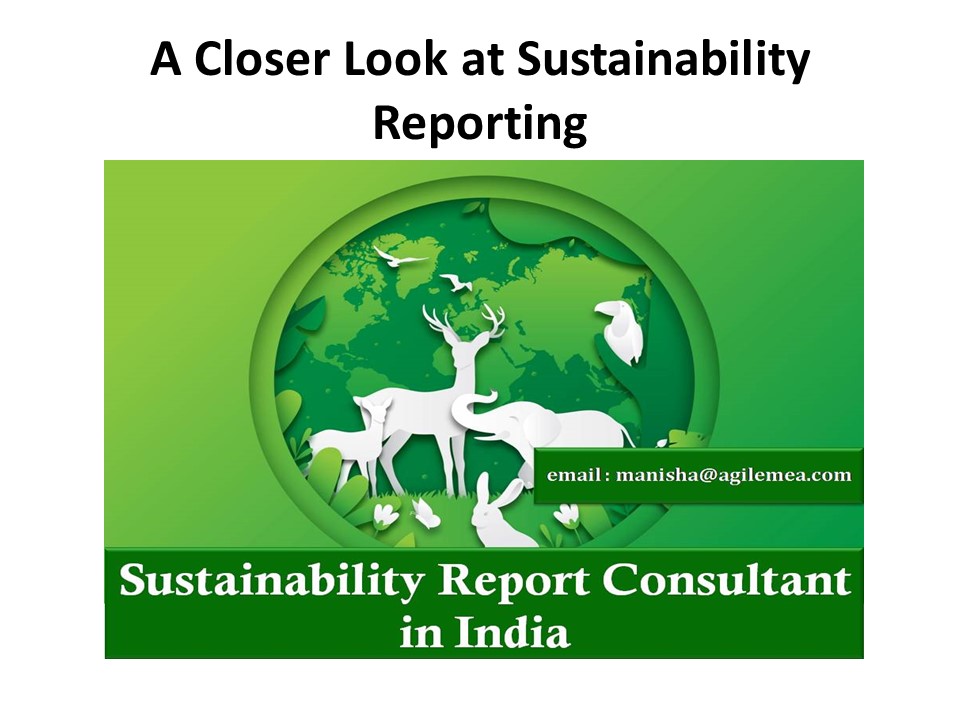A Closer Look at Sustainability Reporting - PowerPoint PPT Presentation
Title:
A Closer Look at Sustainability Reporting
Description:
As a sustainability report consultant in India, Agile Advisors helps companies develop workable strategies that adhere to their mandates and objectives. These techniques range from minor tweaks to the way things are done daily to a complete revision of the organization's mission and vision. – PowerPoint PPT presentation
Number of Views:6
Title: A Closer Look at Sustainability Reporting
1
A Closer Look at Sustainability Reporting
2
- The publication of facts regarding a company's
substantial social, economic, environmental, and
governance implications is called sustainability
reporting. Here, we must emphasize that
sustainability reporting is more than just a
report it also strengthens the community and
reaches far into the operations of the business.
It brings together increased motivation to make
the world better for all people with
longer-lasting profits. - The Importance of Sustainability Reporting for
Your Organization - The following are some justifications for why
your company should care about sustainability
reporting - Comprehensive Assessment of Opportunities and
Risks - To comprehend your organization's existing
situation, you need to conduct a thorough
analysis as the first stage in your
sustainability reporting process. This suggests
that you have the chance to examine the obstacles
and stumbling blocks that stand in the way of
your continued success and rapid advancement.
There are a few places you might have to check,
including - The location of the raw materials.
- Manufacturing
- The effectiveness of your equipment.
- Employee inspiration.
- The generation of waste.
- Marketing techniques.
- Channels in the supply chain.
3
2. Achievement Goes Beyond Profits You can see
from the description that sustainability
reporting aims to record and publish data on
factors that impact the environment, society, and
economy. As a result, you are expanding your
reach such that the company ceases to exist as a
standalone entity and develops into a community,
a regional, and an international entity that
everyone can be proud of. In other words,
sustainability reporting benefits both your
organization and external parties. Reduced
production-related expenses and higher total
company productivity will result from using new,
more productive equipment. Internally, your staff
members will be better able to identify with the
company and put forth more effort to boost
productivity, raise profitability, and advance
the company. 3. A better reputation It also
gives your company a chance to enhance brand
recognition, which is why sustainability
reporting is crucial. Nowadays, most customers
and other stakeholders want to be affiliated with
respectable companies, unlike in the past.
Because of this, they always conduct further
research before purchasing from a firm to ensure
that it does not violate any laws or use
unethical tactics like child labour. You merely
state that "we follow the finest practices and
will go to any extent to make the world a better
place" by displaying your efforts to promote
sustainability.
4
When your sustainability report is finally
completed, you may make a pitch to enhance your
organization's reputation. Since you put up the
effort, capitalize on it to the fullest extent
possible. As an illustration, if you invest a lot
of time and energy into green energy, start a
conversation about it and structure your
marketing strategy around it, especially on
social media, to emphasize the value of
conservation. You'll be astonished at how many
"foot soldiers" are willing to jump on board,
integrate into your neighbourhood, and promote
the brand. These are just a few reasons why
reporting on sustainability is crucial. Other
benefits that you should expect for adopting
sustainability reporting include Increased
effectiveness. Better impact on long-term
planning and corporate strategies. provides a
valuable starting point for comparison with other
businesses. Assisting external stakeholders in
understanding the worth of your business. Our
Function as Consultants for Sustainability
Reports Agile Advisors serves as a
sustainability report consultant, assisting
businesses in conducting more socially and
environmentally conscious operations. We'll
create long-term solutions to the frequently
inimical needs of society, the environment,
economic development, and prosperous
business. An organizations environmental impact
will be evaluated at work, and the business will
either plan how to use its limited resources more
effectively or take actions to minimize the
effect.
5
Our Services Consultation on Sustainability
Reporting For organizations worldwide,
reporting on ESG performance is becoming more
critical. We give a sustainability report
incorporating the UN SDGs, UNGC principles, GRI
Standards, the GHG Protocol, and other global and
regional sustainability frameworks. Planning
Strategically As a sustainability reporting
consultant, Agile Advisors helps companies
develop workable strategies that adhere to their
mandates and objectives. These techniques range
from minor tweaks to how things are done daily to
a complete revision of the organization's mission
and vision. Sustainability Assurance Our pool
of resources includes experts in various
sustainability-related issues, including energy,
water, waste, and human resources. We have
guaranteed sustainability to several clients. To
provide our assurance opinion for a
sustainability report, we analyze the report and
verify the non-financial facts.
6
CSR Management System - ISO 26000 ISO 26000
assesses and implements an organizations
commitment to sustainability and overall
performance. We have supported several
organizations in implementing CSR management
systems in line with ISO 26000 requirements. Busi
ness responsibility reporting (BRR
BRSR) Sustainability disclosures are expected
from stock exchange-registered firms in the form
of the necessary business responsibility
reporting (BRR) and the forthcoming business
responsibility and sustainability reporting
(BRSR). SEBI in India issued the requirements. We
help our clients find monitor and report on KPIs
that fit the BRR and BRSR requirements. Chain of
Sustainable Supply Managing a company's supply
chain is essential to its sustainability
strategy. As many industries progress toward a
more sustainable future, understanding the extent
of the supply chain's impact on the environment,
society, and the economy is becoming more
widespread. Agile helps organizations discover,
manage, and create goals and targets concerning
supply chain opportunities and risks.































